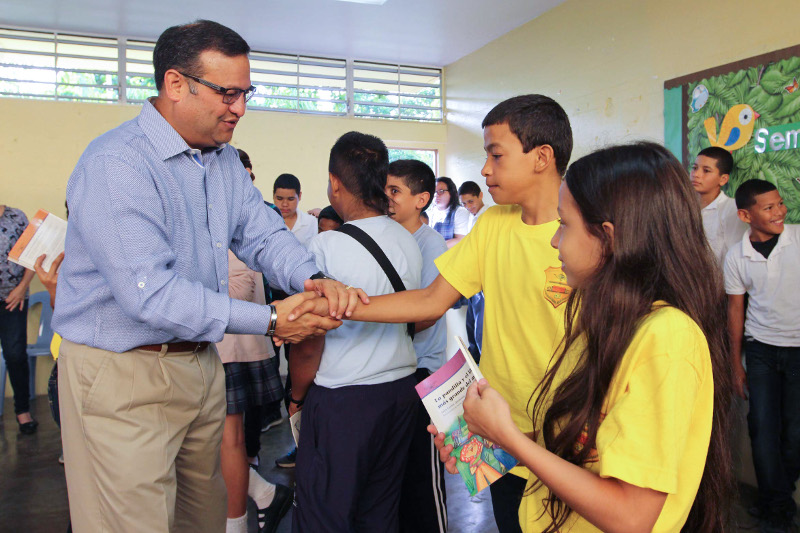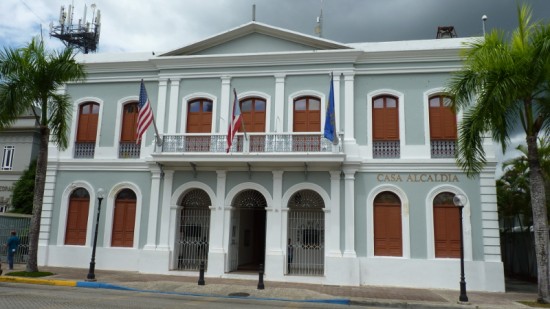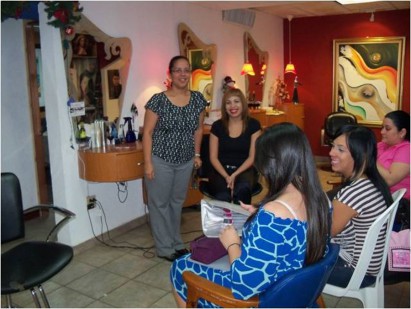
Interview with the Mayor of Caguas, Mr. William Miranda Torres
The Mayor of Caguas defends the use of the city as a giant Lecture Hall where public spaces are used to foster and strengthen lifelong learning for citizens no matter their age, gender, social class or nationality.
Caguas is…
A city that seeks human development by providing a balance amongst all the agents in society and its different economic, democratic, social and environmental areas.
What are the challenges and main priorities of the municipal government of Caguas?
Puerto Rico is going through a moment of economic recession with high unemployment and high public debt. This is impacting our city although we have implemented budget controls and public policies to mitigate the challenges we face through programs, such as: citizen mobility, democratic education, regional alliances, sustainable development and the creation of opportunities for young people, amongst others. For example:
- The Departments of Municipal Education, Cultural Development, Recreation and Sport, supplement formal education.
- Citizen Mobility (Transcriollo) – The partial substitution of the private automobile through the creation of bicycle routes, the use of pedestrian corridors and public transport.
- The Youth Corporation for the Development of Sustainable Communities and the Development Centre for agro-ecological products, which works on the Agroinnova brand. Through the Corporation we are working on agro-ecological projects in the city.
Caguas joined the IAEC in 2009. Which has been the impact of this commitment in the city?
 Our commitment to the principles of the Charter of Educating Cities has translated into the integration of these principles into our Second Strategic Plan 2010-2020.
Our commitment to the principles of the Charter of Educating Cities has translated into the integration of these principles into our Second Strategic Plan 2010-2020.
The Right to an Educating City: We promote the active participation, and the democratic education of students and all our citizens as the key plank in the development of projects and decisions that affect or impact them directly. Our communities undertake their own exercises in citizen participation and develop strategic plans that center on the common good, healthy coexistence, solidarity and the fostering of values that differentiate us as a people.
We have programs that promote art in its various facets and culture, or the diversification of sport in line with the interests and talents of the participants, initiatives in economic development addressed to students and start-ups, projects of the Women’s Bureau as a focal point in the prevention of gender violence and in favour of gender equality. Additionally, we are working on the promotion of the use of the city as a giant Lecture Hall where public spaces are used to foster and strengthen life-long learning for our citizens no matter their age, gender, social class or nationality, amongst others.
The Commitment of the City: We promote the idea of students and citizens learning about our history as a people in order to strengthen their sense of belonging and conserving the beautiful culture that distinguishes us.
Amongst the initiatives developed for the use of public space we would like to point out the Santiago R. Palmer Square, where a group of citizens meets monthly as the People’s University, which promotes citizen participation in a variety of contemporary subjects, where everyone’s opinion counts and is listened to in an atmosphere of respect and in the framework of ethical and civic values.
We promote sustainable practices in our schools by supporting the development of school vegetable gardens. Additionally, we offer technical assistance for the development of companies: an example of this is the Youth Project for the Development of Sustainable Agrinnova Communities. The project fosters the diversity of crops as a sustainable alternative and economic development for community families and the city.
In the Comprehensive Service of People: Our city has and fosters values that differentiate us as a people, including: loyalty, humanism, integrity, commitment, courage and professionalism, and fostering citizen participation regardless of age, gender or nationality. This is a primordial part of our principle of healthy coexistence, respect for each other and the ethical, civic-based, responsible education of our children and all our inhabitants.
What does your governing model comprise?
Based on the idea of Democratic Governance as the art of governing people in which public management is more open and where the responsibility for governing is a shared action between the government and the people, in Caguas we value and foster citizen participation in planning, management itself and assessment.
In 1977 we began to implement the Democratic Governance Model through the creation of the Community Self-Management Department, thus becoming the first municipality in Puerto Rico to take this initiative with the support of the Autonomous Municipalities Act.
The preparation of the Strategic Plan arose from a participatory process bringing together community leaders, non-profit organizations, the private sector and citizens in dialogues and conversations in each of the 11 districts. It was during this participatory democratic exercise where the leaders of the different communities in the city formed groups to analyze the needs of their neighborhoods and to propose the future direction in which they wanted to move their city.
On the other hand, we have redesigned in administrative and community terms the traditional political leadership role and we are working with community leaders to guarantee equality of representation and equality in the decision-making processes of our communities. Collectively, and in the spirit of solidarity, the government and citizens actively participate in the decision making of their communities and city, putting social, economic and infrastructure projects into operation.
How can we foster citizen participation?
Citizen participation generated in the city of Caguas has various facets that range from actions involving the community to social assistance, in which citizens are organized to help residents with a variety of problems. Likewise, the association makes alliances with the schools, churches, shopkeepers, and other institutions in their communities in order to work with the neediest sectors in their communities and in accordance with their realities.
In 2015, in order to fortify our model of democratic governance, we set up the Child and Teen Advisory Council (CANA, original acronym) in order to grant active participation and voice to children and teens in the city’s public policy, which is something we would like to develop further in collaboration with other cities in the IAEC.
What do the Citizen Participation Funds comprise?
The form of citizen participation that is most of special note is the development of projects using the Citizen Participation Funds, in which the communities develop infrastructure projects, through which they can cheapen costs, enhance creativity and commitment and a sense of responsibility to their own projects. Ongoing training allows them to meet their fiscal requirements in order to have direct access to the powers to acquire public funds.
At the same time, the administration of recreational, sport and community facilities by citizen associations generates income that is reinvested in social and infrastructure improvements.
Depending on the needs expressed by the communities, the Municipality can prioritize the use of the public funds by taking into account the collaborative model under which the organizations roll out their proposals. Accordingly, government spending is greatly reduced, which means funds can be funneled to more projects.
Caguas intends to get companies involved in a model of social responsibility. Can you give examples of any initiatives in this sense?
The participation of companies has been significant in the preparation of our City Strategic Plan.
This has allowed us to create a tool for attracting more companies to our city, which is the Caguas Socio-economic Development Incentives Code. This code grants patent payment and moveable asset and property exemptions, requiring, as part of a company’s social responsibility, that it contribute 10% of these exemptions savings to an economic development investment fund. As of today, the 44 companies that have received this exemption have made contributions to this fund, which has allowed us to reinvest in strategic projects in our city.
 Moreover, companies in Caguas are collaborating on social development initiatives and community projects. An example of this is the Beauty Salons project. Small and medium-sized beauty care companies promote the prevention of gender violence establishments.
Moreover, companies in Caguas are collaborating on social development initiatives and community projects. An example of this is the Beauty Salons project. Small and medium-sized beauty care companies promote the prevention of gender violence establishments.
Likewise, as part of the Caguas Educating City Initiative, we would also like to point to the Educating Company project (EMDUCA, original acronym) which provides different companies with the opportunity to contribute to the training and development of our students in technical, vocational and professional degrees.
What is the Youth Entrepreneurial Start-Up experience and how does it impact the creation of small companies?
 The goal of the Youth Entrepreneurial Start-Up program is to expand the vision and knowledge of the teachers and students in Caguas schools as to the importance of business education. The program trains teachers in business education practices and educational strategies for the development of business projects.
The goal of the Youth Entrepreneurial Start-Up program is to expand the vision and knowledge of the teachers and students in Caguas schools as to the importance of business education. The program trains teachers in business education practices and educational strategies for the development of business projects.
The students put what they learn into practice by developing their business idea through the implementation of the skills learned. As part of the process they compete against each other in order to motivate their creativity. Furthermore, the students have the chance to present their companies at a final event where they sell their products and services. Moreover, they visit companies in order to learn different ways of running a business. They are also given talks from local businesspeople.
The young people are also provided with guidance in the process of managing a new business and current state and city legislation, such as licensing, patents, health and safety endorsement and fire-fighting regulations.
We are convinced that in order to create an entrepreneurial culture, we must take action at an early age. That is why we have set up this program, which is a unique program in business education at the municipal level in all of Puerto Rico.
Photos:
Caguas City Council
Damian entwistle (Flickr)
Por categoria
- Assembleia (29)
- Banco de experiências (32)
- Comissão de Coordenação (2)
- Comité (16)
- Congressos (78)
- Dia Internacional (65)
- Encontro (5)
- Experiência destacada (16)
- Exposição (17)
- Formação (18)
- Out of Category (65)
- Prémio (29)
- Publicações (108)
- Redes (164)
- Videos (6)
